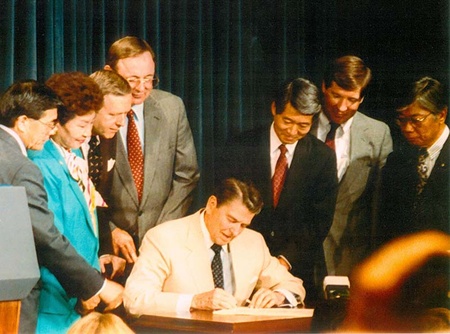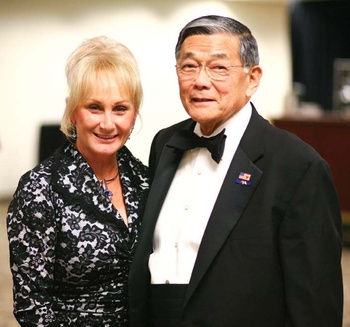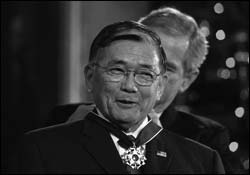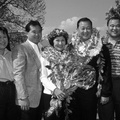Read Part 1 >>
REDRESS
For Norm Mineta, passing redress is still his most satisfying achievement in Congress. The formal push came when the National Japanese American Citizens League (JACL) passed a resolution in 1978 advocating for legislation. Representatives Mineta and Robert Matsui and Senators Daniel Inouye and Spark Matsunaga worked together with community groups to strategize how to get a redress bill passed.
After of years of effort, H.R. 442 was finally set to be debated and Rep. Mineta wanted that to occur on September 17, 1987, the 200th Anniversary of the Constitution. Both Mineta and Matsui spoke in personal terms about what had happened to their families. “We lost our homes, we lost our businesses, we lost our farms, but worst of all, we lost our most basic human rights,” Rep. Mineta said, wiping away tears. “Our own Government had branded us with the unwarranted stigma of disloyalty which clings to us still to this day. So the burden has fallen upon us to right the wrongs of 45 years ago.”
The signing of the Civil Liberties Act of 1988 by President Reagan on August 10 included the President recounting the story of the Mineta family during the war. The President said, “No payment can make up for those lost years. So what is most important in this bill has less to do with property than with honor. For here we admit a wrong; here we reaffirm our commitment as a nation to equal justice under the law.”
In 1995, Norm Mineta left Congress to accept a position at Lockheed Martin. It appeared that his life in the public sector had concluded until 2000 when President Clinton offered the position of Secretary of Commerce to Norm. He became the first Asian American to serve in a President’s Cabinet. As his term was concluding, Norm was surprised to get a call from Vice President-elect Dick Cheney, asking if he would become the new Secretary of Transportation. At first, Norm hesitated. “I didn’t want to be seen as a diminished Democrat,” he explained. Norm’s wife Deni advised that he speak to both President Clinton and Vice President Al Gore (who had just lost a close election). Both encouraged Norm to accept the job. After a face-to-face meeting with President-elect George W. Bush, he accepted and was easily confirmed as Secretary of Transportation in 2001.

On August 10, 1988, President Ronald Reagan signs the redress law, H.R. 442. (Gift of Norman Y. Mineta, Japanese American National Museum [96.370.16A])
SEPTEMBER 11TH
The morning of September 11th, 2001, Secretary Mineta was meeting with the Deputy Prime Minister of Belgium. His chief of staff interrupted the meeting and brought Secretary Mineta to a television, showing black smoke coming out of the World Trade Center in New York City. Unsure if this was a horrendous accident, Secretary Mineta recalled seeing a second commercial airplane suddenly fly into the other tower. Called to the White House, he was escorted to the Presidential Emergency Operations Center (PEOC) located in a bunker under the White House. He and Vice President Cheney were made aware of that a third plane had crashed into the Pentagon.
“When you see one of something happen, it’s an accident,” Mineta noted. “When you see two of the same thing happen, it’s a trend, but when you see three of the same thing happen in a very short period, then it’s a plan.” Secretary Mineta gave the order, “Bring all the planes down.” There were 4,638 planes in the air at the moment and in two hours and twenty minutes, the skies were clear. Asked if this was part of a contingency plan, Secretary Mineta said no. He had to react to the situation as it existed and with the best available knowledge. “We still had seven to ten unaccounted-for airplanes,” he revealed.
Secretary Mineta sent a memo to all the airlines on September 21, forbidding them from practicing racial profiling against Middle Eastern or Muslim passengers. Despite media and political criticism, he never wavered on his stance. His own experiences during World War II informed his decision and he recalled that President Bush had also warned that there would not be a repetition of the government’s actions toward Muslim and Arab Americans “like what happened to Norm.”
In the aftermath of 9/11, Secretary Mineta oversaw the installation of security measures in the vast transportation system and the creation of the Transportation Security Administration, an agency with more than 65,000 employees, and the largest mobilization of a new federal agency since World War II. He served into President Bush’s second term before stepping down on July 7, 2006, the longest-serving Secretary of Transportation in history. Norm took a position as vice chairman with Hill & Knowlton, a strategic global planning firm.
HONORS
The accolades for Norman Mineta continue to this day. In 2001, the Norman Y. Mineta San Jose International Airport was named in his honor. The Mineta Transportation Institute at San Jose State University was also named for him, as was California State Highway 85. He received the President Medal of Freedom from President Bush in 2006.
Beyond domestic recognition, the Japanese government awarded him in 2007 the Grand Cordon, Order of the Rising Sun. Secretary Mineta has become the subject of two Japanese documentaries. Ken Watanabe’s America: Japanese Americans and Post-9/11 America by NHK featured actor Ken Watanabe interviewing Secretary Mineta. Nitto Tire then underwrote a documentary by Fujisankei Communications International (FCI) entitled In Defense of America: The Norman Mineta Story. Both documentaries focus on Secretary Mineta’s character.
In explaining his philosophy of life, Norm reflected, “I think, without a doubt, integrity has to be number one. You have to be true to yourself and do the right thing. You are also going to round the corners in doing the right thing, and there are ways of being able to do that without sacrificing the basic principles and the foundation that gives character to an individual.”

Former Secretary Mineta is often accompanied by his wife Deni to special functions, like the Japanese American National Museum's gala dinners.
*This article was originally published in the Japanese American National Museum's 2012 Dinner Journal, Transforming a Forgotten Story.
© 2012 Japanese American National Museum






